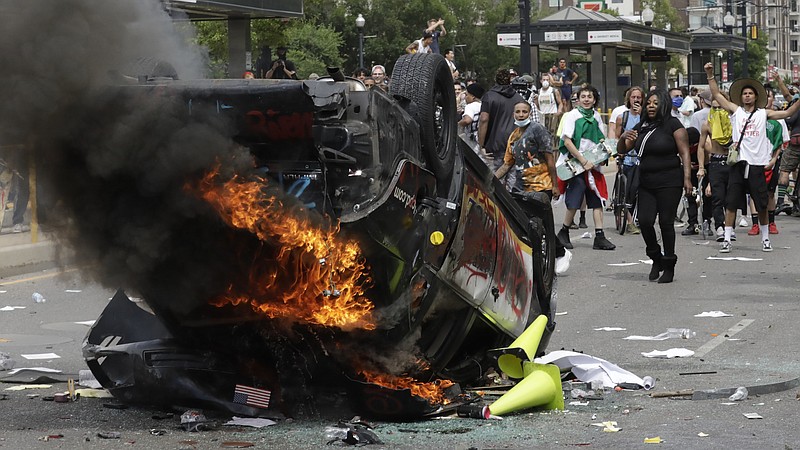WASHINGTON -- Very few of those arrested nationwide in protests against racial injustice appear to be affiliated with highly organized extremist groups, and many are young suburban adults, an Associated Press review of thousands of pages of court documents has determined.
Attorney General William Barr has urged his prosecutors file federal charges on protesters who cause violence and has suggested that sedition charges could apply.
Defense attorneys and civil-rights activists are questioning why the Department of Justice has taken on cases to begin with. They say most belong in state court, where defendants typically get much lighter sentences. And they argue federal authorities appear to be cracking down on violent protesters in an effort to stymie demonstrations.
"It is highly unusual, and without precedent in recent American history," said Ron Kuby, a longtime attorney who has represented scores of clients over the years in protest-related incidents. "Almost all of the conduct that's being charged is conduct that, when it occurs, is prosecuted at the state and local level," he said.
Not to say there hasn't been violence. Police cars have been set on fire. Officers and private citizens have been injured and blinded. Windows have been smashed, stores looted, businesses destroyed.
Some of those facing charges may share far-left or anti-government views. Some have criminal records and were illegally carrying weapons.
Others went to the protests from out of state. Some are accused of using the unrest as an opportunity to steal or create havoc.
But many have had no previous run-ins with the law and no apparent ties to antifa, the umbrella term for leftist militant groups that President Donald Trump has said he wants to declare part of a terrorist organization.
Trump has made "law and order" a major part of his reelection campaign, casting the protests that turned into riots as lawless and violent in mostly Democratic cities he says have done nothing to stymie the mayhem. Trump has argued that some cities have refused to properly clamp down on rioters, so the federal government has to step in.
The government has pushed in scores of cases to keep the demonstrators behind bars while they await their trials.
In Texas, Federal Magistrate Judge Andrew Austin repeatedly challenged the prosecutor to explain why Cyril Lartigue, who authorities say was found with the materials to make a Molotov cocktail in his backpack, should be behind bars while he awaits his trial. Lartigue of Cedar Park, Texas, described his actions that night as a "flash of stupidity," prosecutors said. Letters filed with the court from friends and family members describe him as a caring and honest man.
The 25-year-old lives with his parents in the Austin suburb and had never been in trouble with the law before and wasn't a member of a violent group.
The judge said there are a lot of people "who do something stupid that's dangerous that we don't even consider detaining."
"I have defendants in here with significant criminal histories that the government agrees to release," he said. "We have no evidence of him -- at least that's been given to me -- being a radical or a member of a group that advocates violence toward the police or others. ... What evidence is there that he's a danger to society?"
The judge allowed Lartigue to stay out of jail.
While some of the defendants may hold radical or anti-government beliefs, prosecutors have provided little evidence of any affiliations they have with organized extremist groups.
A Seattle man who expressed anarchist beliefs on social media, was accused of sending a message through a Portland, Ore., citizen communication portal threatening to blow up a police precinct.
In Detroit, city leaders have decried suburbanites arriving in the city and causing havoc.
"If you really want to address these issues, and we stand in solidarity with you, address them in Royal Oak ... address them in Dearborn, address them in Grosse Point," the Rev. Wendell Anthony of the NAACP said in May. "Don't come down to Detroit and tear the city up and then go back home."
